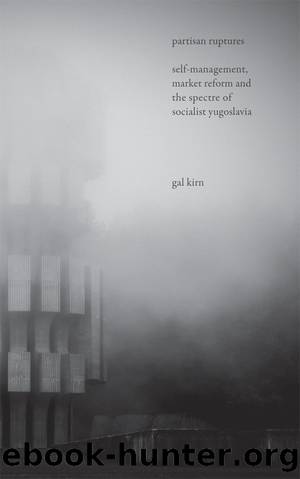Partisan Ruptures by Gal Kirn;

Author:Gal Kirn; [Неизв.]
Language: eng
Format: epub
Publisher: Book Network Int'l Limited trading as NBN International (NBNi)
Neutralisation of Struggles by Unemployment and the Deployment of Surplus Labour to a Neoliberal Employment (âGastarbeiterâ)
Regardless of the difficult position of the industrial workers in particular, the crisis of the socialist industrialisation and market reform was accompanied by a number of political and student movements as well as alternative theoretical and artistic formations, which culminated between 1968 and 1972 (Kanzleiter 2011). This topic will be revisited in Chapter 13, while this chapter will proceed with the analysis of the composition of the working class, including those who were formally excluded or invisible according to the self-management logic. Today, as soon as we utter the word âexcludedâ or âinvisibleâ, we promptly end up entangled in a network of associations or subjected to a dissident temptation that erects grandiose intellectual and artistic beacons in opposition to totalitarian terror. Intellectuals, cultural workers, nationalist politicians, and âthinkersâ of all sorts were victims who were supposedly marginalised and excluded from the public life. However, if this were true, we would never have heard of these people, and it would have been difficult to explain the substantial production and dissemination of the national cultures in Yugoslavia at the time. The socialist authorities certainly did not ignore the dissidents, but rather subjected them to periodic censorship (confiscations and prohibitions of newspaper publications) as well as to a permanent âilluminationâ by the representatives of the socialist authorities who kept persuading the dissidents to agree with their point of view. The intellectual, critical and dissident activities performed an important social role in socialism, and we could hardly claim that those involved in such activities remained on the sidelines.15 On the contrary: in her study, Katja Praznik (2013) demonstrated that cultural intellectuals were a part of the existing hegemonic apparatus of the national culture. According to Rancière, these dissidents are not subjects of revolutionary politics, but represent a normal supplement to the way in which a police state operates. Rancière (1999) believes that those who truly radically subvert the order are invisible and inaudible in a police order â even worse, they have no access whatsoever to any cultural or political apparatuses. In Rancièreâs words, the politics of the excluded involves those âparts of no-partâ that the dominant logic of counting, i.e. the âpoliceâ, does not notice or take into account. Rancièreâs metacritique of (any) police order thus involves a certain surplus, a part of no-part, which is excluded by the normal operation/counting of the police regime. According to Rancière, true âpoliticsâ take place in a situation of complete rupture with the existing order (e.g. with a social contract) â i.e. as something that is diametrically opposed to the search for a consensus. Only the politics of rupture can expose the position of the excluded and the uncounted â of those who are by definition not seen or heard by the police order. Rancière refers to the example of the womenâs struggle for the right to vote, when women demanded that the universality of the fundamental human right to vote
Download
This site does not store any files on its server. We only index and link to content provided by other sites. Please contact the content providers to delete copyright contents if any and email us, we'll remove relevant links or contents immediately.
Twisted Games: A Forbidden Royal Bodyguard Romance by Ana Huang(4034)
The Push by Ashley Audrain(2705)
Den of Vipers by K.A Knight(2701)
Win by Harlan Coben(2667)
Echo by Seven Rue(2248)
Baby Bird by Seven Rue(2224)
Beautiful World, Where Are You: A Novel by Sally Rooney(2181)
A Little Life: A Novel by Hanya Yanagihara(2155)
Iron Widow by Xiran Jay Zhao(2127)
Leave the World Behind by Rumaan Alam(2100)
Midnight Mass by Sierra Simone(2017)
Bridgertons 2.5: The Viscount Who Loved Me [Epilogue] by Julia Quinn(1796)
Undercover Threat by Sharon Dunn(1791)
The Four Winds by Hannah Kristin(1775)
Sister Fidelma 07 - The Monk Who Vanished by Peter Tremayne(1671)
The Warrior's Princess Prize by Carol Townend(1632)
Snowflakes by Ruth Ware(1602)
Dark Deception by Rina Kent(1570)
Facing the Mountain by Daniel James Brown(1556)
